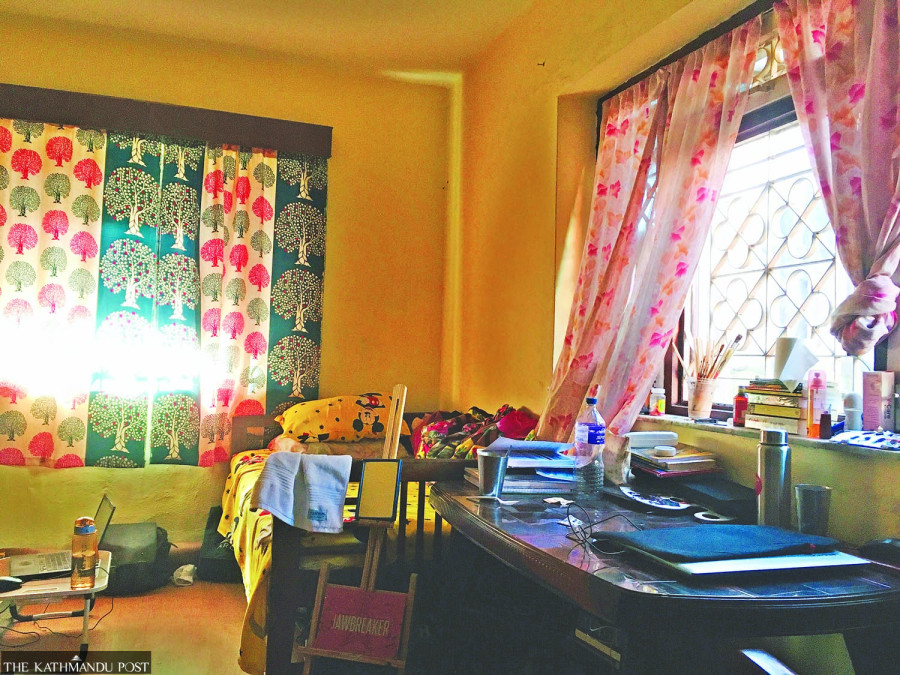Valley
Students struggle to find good hostels in the Capital
For most who come to the Valley for study, private hostels are the only option. But not all provide what they promise.
Aarati Baral
A few summers ago, Aishwarya Jha came to Kathmandu from Rautahat for her undergraduate studies. She started looking for accommodation at private hostels in the Sanepa area of Lalitpur where she would be attending college.
During her search, Jha, who asked for her real name to be withheld for privacy reasons, found a hostel in Kupondole, within walking distance from her college in Sanepa. It was a privately-owned hostel and Jha thought it a suitable option given the quiet location. She signed up and moved in. It took her only a couple of hours of settling in to find that the amenities at the hostel were not up to her expectations and what the owner had promised her.
The toilet she would use was in disrepair and did not have running water.
“I had to carry a bucket of water from the top floor of the building to the toilet downstairs,” said the 22-year-old student who attends an engineering college in Sanepa. “I was disappointed. I felt uncomfortable using the bathroom from the very first day.”
When Jha approached the hostel owner the next day, her concerns were dismissed. “She [the owner] was not interested in listening to my complaints,” Jha said. “She said she would get repairs done, but that never happened.”
Thousands of students from across the country move to Kathmandu every year for educational opportunities. Among their foremost concerns is a good college and a safe place to live. For most, privately-owned hostels are the first choice as they promise good food, clean boarding and even laundry and cleaning services, saving the students both time and hassle, and allowing them to focus on their studies.
However, many hostels are found skimping when it comes to providing quality services and good amenities.
Take food, for example. Jha found herself skipping meals as the quality of food was subpar with only one vegetable item and watery lentil soup with rice in every meal. Meals with chicken and eggs were served only once a week. “The hostel owner cut corners everywhere from food to amenities,” said Jha. “I paid Rs12,000 a month for a three-occupancy room. I did not get my money’s worth.”
Bishal Niroula, 19, attends the Kathmandu Model College at Bagbazar and lives in a hostel at Maitidevi. Like Jha, he is also dissatisfied with the quality of food provided by the hostel. “The overall facility, including food, is not bad, but it isn’t satisfactory either. One time we found a cockroach in one of the dishes,” he said.
Nutritionists say students must have access to quality and nutritional food for their overall growth and development.
“Lack of good food and a poor diet along with consumption of processed food is harmful to health,” said Dr Sudha Shree Adhikari, a nutrition scientist. “Hygiene also plays a major role in maintaining good health. Hostels, home to young adults, must prioritise a hygienic environment and nutritious diet.”
Private hostels are mushrooming in major cities of Nepal, the highest number being in Kathmandu. According to the Hostel Association Nepal, there were more than 800 registered and unregistered hostels in Kathmandu before the Covid pandemic. The number, however, plummeted to 600 due to the pandemic-induced lockdown.
According to the Ministry of Industry’s Cottage and Small Industries Office (CSIO), before September 2017, there were 255 registered hostels in the Valley. Today, there are 141 registered hostels—67 boys hostels, 67 girls hostels and seven coed.
The operation of hostels comes under the ambit of the Industrial Business Act-2020 and hostels fall under the small-scale industries category. As per the Act, private hostels should be registered with the CSIO, or the ward office concerned. The CSIO has a list of criteria for a hostel’s registration which the hostel operators must meet. The office conducts an on-site monitoring before registering hostels to ensure they meet standards for food, cleanliness, sanitation, and safety, and have facilities like libraries and telecommunication. They also check for security measures, disabled-friendly environments and healthcare arrangements.
Jha discovered that the hostel she was staying at was not registered and therefore not subject to monitoring.
Consumer rights activists lament that hostels lack proper government intervention and that rules haven’t always been followed.
“Not all hostels meet the criteria, but are given permits to run by local governments and bodies like the CSIO,” said Bishnu Prasad Timilsina, general secretary of the Forum of Consumer Rights-Nepal. “There are also no local-level or government monitoring mechanisms for private hostels. As a result, such hostels are growing as unscrupulous businesses.”
Timalsina added, “It should be the duty of the government to monitor the hostels’ activities to ensure they abide by the rules and regulations.”
The CSIO makes monitoring visits to registered hostels based on complaints filed by the aggrieved parties or on a case-by-case basis. If a hostel is operating without registration, the local unit or the CSIO can register them. Unregistered businesses can also be prosecuted through legal procedures under the Industrial Business Act-2020.
If a business is found to be running without registration as per Section 3 of the Industrial Business Act, the Ministry of Industry’s CSIO may, on the recommendation of the industry registration body, order immediate closure of such a business and impose a fine of up to Rs5000.
Officials at the Kathmandu Metropolitan City said they don’t monitor private hostels but a metropolitan-level law-making process is underway to study the issue and bring the monitoring of the hostels under its jurisdiction.
But some local units have been monitoring private hostels independently.
Subodh Khadka, secretary of Kathmandu Metropolitan City ward 10 (Baneshwar area), said that ward representatives keep an eye on the hostels. He admitted that many hostels are operating without registration. “We ask them to register and remind them of the consequences if they don’t comply,” said Khadka.
Lalitpur Metropolitan City ward 1 in Kupondole, where Jha lives, does not monitor private hostels, according to Santosh Poudel, an official of the ward.
“We get complaints against private hostels but we haven’t monitored them,” Poudel said. “But we are trying.”
According to Lalitpur Metropolitan City officials, the local unit is monitoring privately-run hostels to some extent, but it has not been effective. Raju Bhujel, an official at the Hostel Association, said that while they ask all people involved in the business to register and ensure quality, many still don’t.
Timilsina, the consumer rights activist, said the government must bring stringent laws to ensure all hostel operators get registered. “The metropolitans and ward offices must work in coordination. If not, hostelers will continue to suffer,” he said.
Meanwhile, Jha, who continued staying at the hostel in Kupondole for six months despite poor living conditions, found another hostel that was much more suited to her needs. “I was reluctant to leave the first hostel thinking of the hassles involved in looking for a new place. And what if all hostels in the city were the same with subpar food and poor hygiene conditions?” she said. “But I still moved to another hostel on the recommendation of a friend. I did a thorough screening of the hostel before committing. I also ensured that this hostel was registered. I am satisfied here.”




 22.69°C Kathmandu
22.69°C Kathmandu













